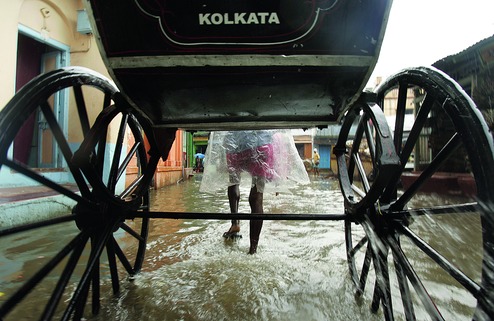
When the honking has ceased and the fuming has stopped, you will hear him. Amidst the rush and racket on Calcutta's roads, the rickshaw-wallah's ting-ting and khatt-khat-taa-khatt seem like music to the ear all year round. Usually happy to belong in the footnotes, come monsoons, when the skies burst open and fill up the narrow lanes of this huge city, it is these men who make waves silently.
There is an old joke - that at the height of waterlogging, when the city comes to a standstill, even the governor takes a tana or handpulled rickshaw. The anachronistic mode of conveyance may have a huge image problem, though of course the sight of a "human horse" has donned the cover of many a coffee table book. But then, in this city, images of subhuman living are aplenty - in the innumerable cracks and crevices of Calcutta's many crusts where during the monsoon months, dog poop mixes with discarded plastic bags, and fleas swim the stinking blackened waters. And yet, lives must go on living here. As must the poultry, meat, and vegetables before they can spread themselves on elegant dinner tables, undertaking a journey that is often the rickshaw-wallah's sole burden.
Sukhdev has been ferrying goods and people for 30 years in and out of the constricted offshoots of B.B. Ganguly Street. His lean but sturdy frame belies his 64 years. He makes Rs 200-250 a day, of which Rs 30 goes to his malik, the owner of the rickshaw. On a watery day, the money easily doubles - for wading through the waterlogged nooks of Tiretta Bazar. "Riders often pay extra on their own; I don't have to ask," he says shyly. And why won't they? Who else would beget deliverance in the low-lying areas of Bow Street, Metcalfe Street, Weston Street and Peter Lane when water, instead of being the giver of life, becomes the great disrupter?
There are about 6,000 hand-pulled rickshaws tinkling in and around central and north Calcutta. That's the official figure though. Much hue and cry was raised when, in 2005, the CPM government, in an effort to erase the man-pulling-man image, tried to ban them. Alternative rehabilitation plans, however, didn't quite work out.
"These men earn their living through hard work, not theft or dacoity... What is wrong with that?" argues Mukhtar Ali, general secretary of the All Bengal Rickshaw Union. Ali accuses the earlier government of not including them in the rehabilitation talks. He also questions the feasibility of poultry farming that was the proposed alternative for these men, many of whom have minimal employment skills. "I have been writing to the honourable chief minister; we are hopeful of working out something that will be acceptable to all," Ali says, before turning his attention to other matters of import. He assures that rehabilitation will take into account both licensed and unlicensed rickshaw pullers.
The other type of rickshaw, although originally meant to ply outside the city's limits, is ubiquitous. Laws and licensing of these cycle rickshaws may be a clouded affair but not their need or occurrence. " Ei maashe 10-12 deen gari chalalei amar hoye jabe," boasts an eager young fellow. This month, so long as the deluge persists, he will earn in 10-12 days as much as he normally would in a whole month.
Nimai Bagh recalls with pride his years spent pedalling the Kasba area when it was a green suburb inhabited mostly by foxes. "The year 1972 had brought terrible floods; the water had risen neck deep. We were given boats to rescue the few people living here... " A relief centre was set up where Ruby Hospital now stands. It was the job of Bagh and his ilk to distribute the khichuri, boiled eggs, chire and powder milk. "Expecting mothers were given special food," he doesn't forget to add. A potbellied man of 65, Bagh runs a tea shop and is a mentor of sorts to his younger counterparts.
The worst of the season may be yet to arrive, but some areas such as Topsia have been there, done that. Old and emaciated, Ashim Dolui takes his rickety rickshaw out whenever he can, through all the waste and water. At 66, his missing front teeth make it impossible for others to understand what he says, but he cannot stop talking about his children, especially his youngest daughter, Jeeta. "Being a very good student, her teachers told me to let her go to college," he announces with pride. If you peep into the Doluis' 8ft x 8ft home just behind the rickshaw stand, you will see Jeeta tutoring some of the children of the area.
In the meantime, the manholes have opened up and the corporation pump has regurgitated the standing pool. The water level is receding, and with it perhaps the fortunes of Calcutta's rickshaw-wallahs. Maybe it is time someone gave the wheels of fortune a shove.










